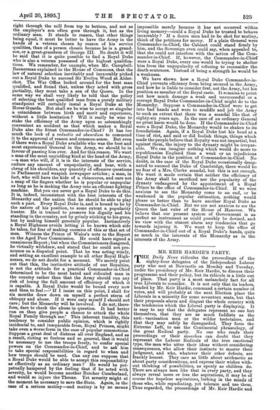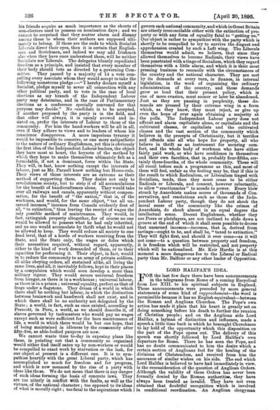MR. KEIR HARDIE'S PARTY. T HE Daily News ridicules the proceedings
of the- eighty-four delegates of the Independent Labour party who met at Newcastle on Monday and Tuesday, under the presidency of Mr. Keir Hardie, to discuss their programme and their policy, but its ridicule is a little out of place. That party is a most melancholy fact for all true Liberals to consider. It is not only that its leaders, headed by Mr. Keir Hardie, command a certain number of votes, and will probably at the next Election place the Liberals in a minority for some seventeen seats, but that. their proposals alarm and disgust the whole country with the tendencies which the Liberal party is displaying. It is easy to say that the delegates represent no one but themselves, that they are as much faddists as the anti - vaccination men or the wilder teetotalers, and that they may safely be disregarded. They form the Extreme Left, to use the Continental phraseology, of the great Radical party. No one who reads their proceedings or their speeches can doubt that they represent the Labour Radicals of the true emotional type, the men who utter their ideas without considering consequences, who allow their instincts to master their judgment, and who, whatever their other defects, are frankly honest. They care as little about arithmetic as about party considerations, and express their wishes with- out thinking of possibilities, as openly as children do. There are always men like that in every party, and they always reveal more or less the aspirations, it may be of course the hopeless aspirations, lurking in the minds of those who, while repudiating, yet tolerate and use them. Thus regarded, the proceedings of Mr. Keir Hardie and his friends acquire as much importance as the shouts of non-electors used to possess on nomination days ; and we cannot be surprised that they scatter alarm and dismay among those to whom their authors are supposed ulti- mately to belong. If these are the ends to which Socialist Liberals direct their eyes, then it is certain that English- men and Scotchmen, and indeed we may add Irishmen also when they have once understood them, will be neither Socialists nor Liberals. The delegates bluntly repudiated freedom as a principle, and insisted that every member of their body should vote as directed by a governing Com- mittee. They passed by a majority of 14 a vote com- pelling every associate whom they would accept to take the following monstrous pledge :—" I hereby declare myself a Socialist, pledge myself to sever all connection with any other political party, and to vote in the case of local elections as my branch of the Independent Labour party may determine, and in the case of Parliamentary elections as a conference specially convened for that purpose may decide." No candidate is to be accepted, if another proposed by the party is in the field, and that other will always, it is openly avowed and in- sisted on, prefer the interests of Labour to those of the community. For him the hand-workers will be all in all, even if they adhere to views and to leaders of whom his conscience disapproves. A more imperious tyranny it would be impossible to conceive, or one more antipathetic to the nature of ordinary Englishmen, yet this is obviously- the first idea of the Independent Labour leaders, the object they have most at heart, the keynote of the method by which they hope to make themselves ultimately felt as a formidable, if not a dominant, force within the State. They will, in fact, know nothing except the interests of labour, just as Mr. Parnell knew nothing but Home-rule. Their views of those interests are as extreme as their method of supporting them. They desire not only to revolutionise society, but to strip it of all accumulations for the benefit of handicraftsmen alone. They would take aver all railways and canals, apparently without compen- sation, for the benefit of " the nation," that is, of the workmen, and would, for the same object, " tax all un- earned incomes," incomes from Consols evidently first of all, " to extinction," thus leaving the receipt of wages the mly possible method of maintenance. They would, in fact, extinguish property altogether, for of course no one would be allowed to possess what he had only inherited, and no one would accumulate by thrift what he would not be allowed to keep. They would reduce all society to one dead level, that of a horde of workers receiving from the State, and the State only, the wages or doles which their necessities required, without regard, apparently, either to the kind of work demanded of them, or to their capacities for performing it. Their object, in fact, would be to reduce the community to an army of private soldiers, all alike obeying orders, all sustained alike, all living the same lives, and all, it inevitably follows, kept in their places by a compulsion which would soon develop a more than military rigour. They would secure universal freedom from hunger, as there is in a workhouse ; universal labour, as there is in a prison ; universal equality, perfect as that of frogs under a flagstone. They dream of a world in which there shall be nothing but labour, in which the distinction between brainwork and handwork shall not exist, and in which there shall be no authority not delegated by the State ; a world, in fact, such as once existed, according to Prescott, in Peru, a world, as we should describe it, of slaves governed by taskmasters who would pay no wages except such as were sufficient for the bare maintenance of life, a world in which there would be but one hope, that of being maintained in idleness by the community after fifty-five, as able-bodied paupers are now.
We cannot waste time to-day in exposing plans like these, in pointing out that a community so organised would either find itself eaten up by non-workers or would be compelled to exact work by starvation or the lash, for our object at present is a different one. It is to sym- pathise heartily with the great Liberal party, which has accomplished so much for freedom and for progress, and which is now menaced by the rise of a party with ideas like these. We do not mean that there is any danger of such ideas forming the basis of concrete laws. They are too utterly in conflict with the faults, as well as the virtues, of the national character ; too opposed to its ideas of what is morally right ; too fatal to the aspirations which govern each national community, and which in Great Britain are utterly irreconcilable either with the extinction of pro- perty or with any form of equality fatal to " getting on." Our object is rather to sympathise with the party which is shortly to be compelled to try to survive the disgust and apprehension created by such a Left wing. The Liberals themselves would admit, we believe, that since they allowed themselves to become Radicals, their views have been penetrated with a tinge of Socialism, which they regard themselves with a little alarm, and which it is their most pressing business to reconcile with the circumstances of the country and the national character. They are met by its demands at every turn, in finance, in internal legislation, in the work of organising the ordinary administration of the country, and those demands grow so loud that their present policy, which is one of mere evasion, must sooner or later be abandoned. Just as they are pausing in perplexity, these de- mands are pressed by their extreme wing in a form which, as they know, they must reject, or give up even the hope of ever again obtaining a majority at the polls. The Independent Labour party does not affront and alarm capitalists alone, or capitalists and the cultivated classes, or capitalists and the cultivated classes and the vast section of the community which believes in the precepts of Christianity, but it terrifies and offends also all who hope for property, all who believe in thrift as an instrument for securing com- fort, and the whole body of workmen who have either fairly paid work, or who have confidence in themselves and their own faculties, that is, probably four-fifths, cer- tainly three-fourths, of the whole community. These will all recoil before such a programme as this, and most of them will feel, unfair as the feeling may be, that if this is the result to which Radicalism, or Liberalism tinged with Socialism, tends, then they must cease to be either Radicals or Liberals, and consent, however reluctantly, to allow " reactionaries " to accede to power. Every blow struck by Anarchists makes scores of thousands of Con- servatives, and resolutions such as those of the Inde- pendent Labour party, though they do not shock the moral sense of the community like the crimes of Anarchists, do shock almost in an equal degree the intellectual sense. Decent Englishmen, whether they are Peers or platelayers, are not inclined to slide down a groove at the end of which it shall seem possible to decree that unearned incomes—incomes, that is, derived from savings—ought to be, and shall be, " taxed to extinction." They will fight first, and should it ever come—as it will not come—to a question between property and freedom, it is freedom which will be restricted, and not property which will be nationalised. Mr. Keir Hardie is at this moment a more dangerous foe to the Liberal or Radical party than Mr. Balfour or any other leader of Opposition.



































 Previous page
Previous page